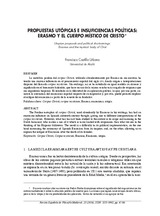Propuestas utópicas e insuficiencias políticas: Erasmo y el cuerpo místico de Cristo
Utopian Proposals and Political Shortcomings: Erasmus and the Mystical Body of Christ
Autor
Castilla Urbano, Francisco
Editor
UCOPressFecha
2016Materia
Corpus ChristiCorpus mysticum
Erasmo
Erasmismo
Utopía
Erasmus
Erasmism
METS:
Mostrar el registro METSPREMIS:
Mostrar el registro PREMISMetadatos
Mostrar el registro completo del ítemResumen
La metáfora paulina del corpus Christi, utilizada abundantemente por Erasmo en sus escritos, ha
tenido una enorme influencia en el pensamiento español del siglo XVI, dando origen a interpretaciones
dispares del llamado corpus mysticum. Sin embargo, no se ha estudiado en igual medida su alcance y
significado en el humanista holandés, que hace un uso de la misma mucho más cargado de utopismo que
sus seguidores hispanos. El resultado es la dificultad de su aplicación política, lo que, por una parte, aumenta
la autonomía del erasmismo español respecto de su inspirador y, por otra, puede permitir explicar
el eclipse del erasmismo a partir de la muerte de su fundador. The Pauline metaphor of corpus Christi, used abundantly by Erasmus in his writings, has had an
enormous influence on Spanish sixteenth-century thought, giving rise to different interpretations of the
corpus mysticum. However, what has has not been studied to this extent is its scope and meaning in the
Dutch humanist, who makes a use of it which is more loaded with utopianism than what we see in the
thinking of his Hispanic followers. The result is a difficulty in its political implementation, on the one
hand increasing the autonomy of Spanish Erasmism from its inspirer, and, on the other, allowing us to
explain the eclipse of Erasmism after the death of its founder.

